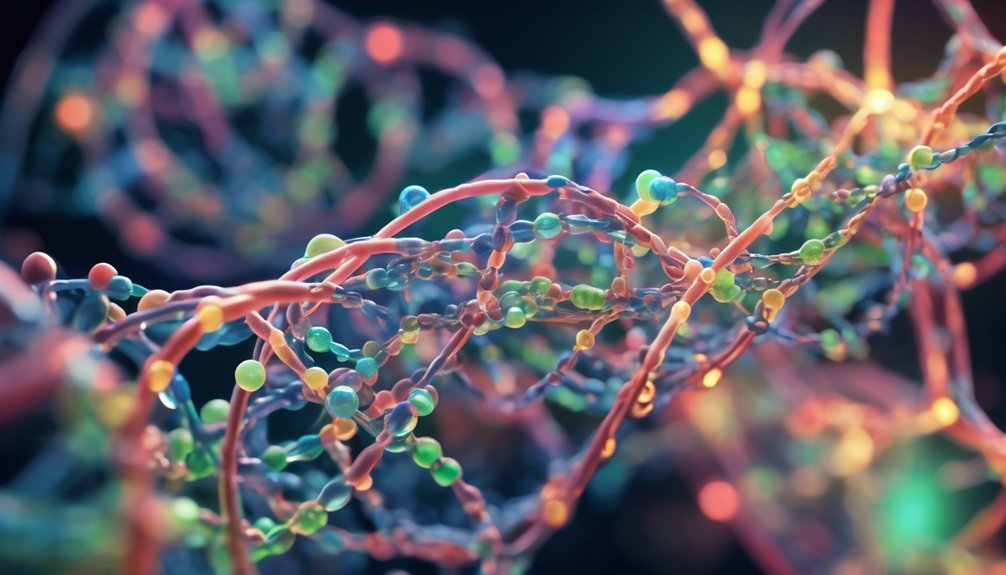You may have heard about the potential benefits of Vitamin C in cancer healing, but do you truly understand its role in this complex process? Beyond its antioxidant properties and immune-boosting abilities, Vitamin C's impact on cancer cell growth and treatment side effects is worth exploring. Are you aware of the dosage considerations for patients and the future implications this humble vitamin might hold in cancer treatment? The multifaceted relationship between Vitamin C and cancer healing is a topic that warrants further exploration to uncover its full potential.
Key Takeaways
- Vitamin C acts as a potent antioxidant, protecting cells from free radical damage.
- Enhances immune system function, aiding in cancer defense and treatment.
- Reduces treatment side effects, boosts immune response to withstand therapy.
- Inhibits cancer cell growth, promotes apoptosis, and may reduce tumor size.
- Enhances traditional treatments, improves outcomes, and quality of life in cancer patients.
Antioxidant Properties of Vitamin C
Unlocking the potential of Vitamin C in cancer healing begins with understanding its powerful antioxidant properties. Vitamin C acts as a potent antioxidant, protecting cells from damage caused by free radicals. These free radicals are unstable molecules that can harm healthy cells and lead to various diseases, including cancer. By neutralizing these free radicals, Vitamin C helps in preventing cell damage and supports overall cellular health.
Moreover, Vitamin C plays a crucial role in skin rejuvenation and wound healing. As an antioxidant, Vitamin C promotes collagen synthesis, which is essential for maintaining skin elasticity and firmness. Collagen is a protein that provides structure to the skin, and Vitamin C helps in its production, leading to improved skin texture and appearance.
Additionally, Vitamin C aids in wound healing by supporting the formation of new blood vessels and promoting tissue repair.
Incorporating Vitamin C-rich foods or supplements into your diet can provide you with the necessary antioxidant support for skin health, wound healing, and overall well-being. By harnessing the antioxidant properties of Vitamin C, you can actively contribute to your body's healing processes.
Immune System Support
Building upon the foundation of Vitamin C's antioxidant properties, it's imperative to explore its role in supporting the immune system. Vitamin C plays a crucial role in enhancing cellular defense mechanisms against cancer by boosting the immune system's ability to identify and destroy cancerous cells. This potent antioxidant helps in neutralizing free radicals that can damage immune cells, thereby aiding in the maintenance of a healthy immune response.
Moreover, Vitamin C is known for its immune modulation properties, meaning it can regulate the immune system's activity. By modulating immune responses, Vitamin C helps prevent chronic inflammation and autoimmune reactions while promoting an effective response against cancer cells.
Studies have shown that Vitamin C supplementation can enhance the function of various immune cells, such as natural killer cells and T-cells, which are essential for targeting and eliminating cancerous cells.
Incorporating Vitamin C into cancer treatment plans can provide valuable support to the immune system, strengthening its ability to defend against cancer and improve overall health outcomes.
Reduction of Treatment Side Effects

To mitigate the adverse effects of cancer treatments, such as chemotherapy and radiation therapy, incorporating Vitamin C supplementation can serve as a valuable adjunct therapy. Vitamin C plays a crucial role in reducing treatment side effects by enhancing treatment tolerance and minimizing the impact of various symptoms experienced during cancer therapies. Here are ways in which Vitamin C can help in this aspect:
- Boosting Immune Function: Vitamin C aids in strengthening the immune system, which can become compromised during cancer treatments, helping the body better withstand the side effects of such therapies.
- Reducing Oxidative Stress: Vitamin C is a potent antioxidant that helps combat oxidative stress induced by treatments like chemotherapy and radiation, thereby reducing the associated side effects.
- Enhancing Wound Healing: Vitamin C promotes tissue repair and wound healing, which can be particularly beneficial for patients undergoing cancer treatments that affect skin integrity or cause mucositis.
Impact on Cancer Cell Growth
As we shift our focus towards exploring Vitamin C's impact on cancer cell growth, it's important to consider the potential implications of this essential nutrient in the context of cancer treatment.
Vitamin C has been studied for its role in regulating cell proliferation, a crucial factor in cancer development. Research suggests that Vitamin C can inhibit the growth of cancer cells by interfering with pathways that promote uncontrolled cell division.
Moreover, Vitamin C has shown promise in inducing apoptosis, a process where cancer cells are programmed to die, thereby preventing the spread of the disease. By promoting apoptosis induction, Vitamin C may help in reducing tumor size and preventing metastasis, ultimately improving treatment outcomes.
Understanding the mechanisms by which Vitamin C influences cancer cell growth is vital for developing targeted therapies that harness the potential of this essential nutrient. Incorporating Vitamin C into cancer treatment protocols shows promise in inhibiting cell proliferation and promoting apoptosis, offering new avenues for improving patient care and outcomes.
Potential for Improving Outcomes

With the potential for improving outcomes in cancer treatment, the role of Vitamin C is increasingly being recognized for its impact on patient health. Clinical trials have shown promising results regarding the use of Vitamin C as an adjunct therapy in cancer treatment. Patient education plays a crucial role in ensuring individuals understand the benefits of incorporating Vitamin C into their treatment plans. Here are a few key points to consider:
- Clinical Trials: Recent studies have demonstrated that high-dose intravenous Vitamin C can help improve quality of life and potentially enhance the effectiveness of traditional cancer treatments.
- Patient Education: Informing patients about the role of Vitamin C in cancer healing empowers them to make informed decisions about their treatment options.
- Improved Outcomes: Incorporating Vitamin C into cancer treatment regimens has the potential to lead to better outcomes, including increased survival rates and reduced treatment side effects.
Combating Oxidative Stress
In the realm of cancer healing, combating oxidative stress emerges as a pivotal focus area for enhancing treatment efficacy and patient well-being. Oxidative stress, characterized by an imbalance between free radicals and antioxidants in the body, plays a significant role in cancer progression and treatment outcomes. Vitamin C, a potent antioxidant, aids in combating oxidative stress through various mechanisms.
Firstly, vitamin C supports cellular repair by neutralizing free radicals that cause cellular damage and contribute to inflammation, a key driver of cancer development.
Additionally, vitamin C plays a crucial role in DNA protection, preventing mutations that could lead to uncontrolled cell growth characteristic of cancer.
Furthermore, vitamin C promotes apoptosis, the natural process of programmed cell death, which helps eliminate cancerous cells.
Role in Chemotherapy Effectiveness

You may wonder about the significant role vitamin C plays in enhancing the effectiveness of chemotherapy. Research has shown that vitamin C can positively impact treatment response during chemotherapy by influencing cellular mechanisms. Here's how:
- Enhanced Chemotherapeutic Effects: Vitamin C has been found to enhance the effects of certain chemotherapy drugs, potentially leading to better outcomes for cancer patients.
- Reduced Chemoresistance: Vitamin C may help in overcoming chemoresistance, a common challenge in cancer treatment where cancer cells become resistant to chemotherapy drugs.
- Protection of Healthy Cells: Vitamin C has the ability to protect healthy cells from the toxic effects of chemotherapy drugs, allowing for targeted destruction of cancer cells while minimizing damage to normal tissues.
Understanding the role of vitamin C in chemotherapy effectiveness can provide valuable insights for healthcare providers and patients seeking to optimize cancer treatment outcomes.
Enhancing Radiation Therapy
Radiation therapy, a cornerstone of cancer treatment, can be further optimized through the addition of vitamin C. Studies have shown that vitamin C enhances the effects of radiation therapy by acting as a radiation sensitizer. When used in conjunction with radiation, vitamin C can increase the sensitivity of cancer cells to radiation, making the treatment more effective in targeting and destroying tumors.
This enhanced radiation sensitization can lead to improved tumor response rates, ultimately aiding in the overall success of the therapy.
The synergistic effect of vitamin C with radiation therapy has been attributed to its ability to induce oxidative stress in cancer cells, leading to increased DNA damage and cell death. Additionally, vitamin C has been found to protect normal cells from the harmful effects of radiation, further emphasizing its potential in enhancing the therapeutic ratio of radiation treatment.
Vitamin C and Tumor Shrinkage

To observe the impact of vitamin C on tumor shrinkage, numerous studies have delved into the potential of this essential nutrient in inhibiting the growth and spread of cancerous masses. When it comes to tumor regression and inhibiting cancer progression, vitamin C has shown promising effects. Here's how:
- Antioxidant Properties: Vitamin C acts as a powerful antioxidant, protecting cells from damage caused by free radicals, which can contribute to tumor growth and cancer progression.
- Collagen Synthesis: Vitamin C plays a crucial role in collagen production, which is essential for maintaining the structure of tissues and potentially inhibiting tumor invasion and metastasis.
- Immune System Support: Vitamin C boosts the immune system, aiding in the body's ability to recognize and destroy cancerous cells, potentially leading to tumor shrinkage and limiting cancer progression.
Synergistic Effects With Other Treatments
In exploring the broader spectrum of cancer treatment, the potential synergistic effects of vitamin C with other therapies have garnered significant attention. Treatment combinations hold great promise in enhancing the healing potentials for cancer patients. When vitamin C is combined with certain chemotherapy agents or radiation therapy, it has shown to increase the effectiveness of these treatments while reducing their toxic side effects.
| Treatment Combination | Healing Potential | Evidence |
|---|---|---|
| Vitamin C + Chemotherapy | Enhanced tumor response, reduced side effects | Clinical studies support efficacy |
| Vitamin C + Radiation Therapy | Increased tumor sensitivity, healthy tissue protection | Preclinical trials show promising results |
| Vitamin C + Immunotherapy | Improved immune response, enhanced tumor targeting | Emerging research suggests benefits |
These synergistic effects highlight the importance of considering vitamin C as a complementary therapy in cancer treatment regimens. By harnessing the power of treatment combinations, healthcare providers can potentially offer more effective and well-tolerated options for patients on their healing journey.
Dosage Considerations for Patients

Consideration of the appropriate dosage for vitamin C in cancer treatment is crucial for optimizing its therapeutic benefits while minimizing the risk of adverse effects. When determining the right dosage for patients, it's essential to take into account absorption challenges and ensure patient compliance for effective outcomes.
Dosage Considerations:
- Absorption Challenges: Vitamin C absorption can be limited due to factors such as gastrointestinal issues or certain medications. Consider alternative delivery methods like intravenous administration for better absorption rates.
- Patient Compliance: Establishing a manageable dosage schedule is key to ensuring patients adhere to the treatment plan. Simplify dosing instructions and provide support to enhance compliance.
- Individualized Approach: Tailoring the dosage to each patient's specific needs and health status is imperative. Regular monitoring and adjustments based on response levels can optimize the therapeutic effects of vitamin C.
Future Implications and Research Opportunities
Future Implications and Research Opportunities surrounding the integration of vitamin C in cancer healing present significant potential for advancing treatment outcomes and understanding the underlying mechanisms of action. Clinical trials play a pivotal role in exploring the efficacy of vitamin C as an adjunct to conventional cancer therapies. These trials aim to provide robust evidence on the impact of vitamin C on tumor growth, patient survival rates, and quality of life during cancer treatment.
Research into the molecular mechanisms underlying vitamin C's anti-cancer properties is crucial for developing targeted therapies. Understanding how vitamin C interacts with cancer cells at a cellular and genetic level can pave the way for personalized treatment approaches. By elucidating these mechanisms, researchers can identify specific subtypes of cancer that may respond better to vitamin C therapy, leading to more tailored and effective interventions.
| Future Research Areas | Benefits | Challenges |
|---|---|---|
| Precision Medicine | Customized treatments for individual patients | Cost of personalized therapies |
| Immunotherapy Combinations | Enhanced immune response to cancer cells | Potential side effects of combination treatments |
| Biomarker Development | Early detection and monitoring of treatment response | Validation of biomarkers in clinical settings |
| Genetic Profiling | Identifying genetic markers for vitamin C response | Ethical considerations in genetic testing |
Frequently Asked Questions
Can Vitamin C Prevent Cancer Development in Healthy Individuals?
To prevent cancer development in healthy individuals, vitamin C can play a crucial role. It aids in protecting cells from damage and supporting immune function, which is vital for cancer prevention. Ensuring an adequate intake of vitamin C through a balanced diet rich in fruits and vegetables can contribute to overall health and potentially reduce the risk of developing cancer. Incorporating this essential nutrient into your daily routine is a proactive step towards wellness.
Does Vitamin C Interact With Specific Cancer Medications?
You'd think that Vitamin C is just a harmless little vitamin, but surprise! It can actually mess with some cancer medications.
When it comes to Vitamin C absorption and cancer drug interactions, you gotta be cautious. Vitamin C might interfere with how certain cancer drugs work in your body, affecting their efficacy.
Is Vitamin C Supplementation Safe for All Cancer Patients?
When considering vitamin C supplementation for cancer patients, it's crucial to focus on appropriate dosages and potential risks. Patients should consult with their healthcare provider to determine safe levels of vitamin C intake. Excessive dosages can lead to adverse effects like digestive issues or kidney stones. Understanding individual needs and medical history is essential to ensure the safe use of vitamin C supplements during cancer treatment.
Can Vitamin C Reverse Chemotherapy-Induced Hair Loss?
If you're wondering about hair regrowth after chemotherapy, vitamin C may offer some support. Studies suggest that vitamin C's antioxidant properties could help promote hair regrowth by protecting hair follicles.
While more research is needed, incorporating vitamin C-rich foods or supplements into your diet may aid in chemotherapy-induced hair loss.
Consulting with your healthcare provider for personalized advice on vitamin C supplementation during cancer treatment is recommended for optimal support.
Does Vitamin C Impact the Recurrence of Cancer Post-Treatment?
Boost your immune support naturally post-treatment. Vitamin C plays a key role in combating oxidative stress, potentially reducing cancer recurrence risk. Studies suggest that adequate levels of vitamin C may help regulate immune response and protect cells from damage.
Incorporating vitamin C-rich foods in your diet can be a simple yet effective way to support your body's defenses against cancer recurrence. Remember, consult with your healthcare provider for personalized recommendations.
Conclusion
In conclusion, Vitamin C's role in cancer healing cannot be underestimated. As the saying goes, "an apple a day keeps the doctor away," incorporating Vitamin C into cancer treatment regimens can greatly benefit patients by enhancing immune function, reducing treatment side effects, and potentially improving outcomes. With further research and exploration of dosage considerations, Vitamin C holds promise as a valuable adjunct therapy in the fight against cancer.





